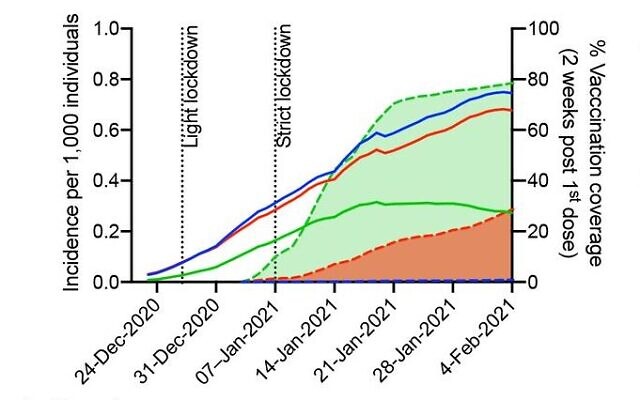A new study shows that Israel’s vaccination program saved many lives by reaching the elderly in the nick of time, stopping the British coronavirus variant in its tracks as it started to spread among the over-60 population.
The extra-infectious variant has proven 45 percent more transmissible than the regular coronavirus in Israel, researchers at Tel Aviv University concluded. The strain has amazed doctors by spreading so quickly that two months after first arriving in Israel, it has come to account for 95% of coronavirus cases.
It has been blamed for high death rates, with some 40% of all deaths caused by the pandemic recorded in January and February alone. But Tel Aviv University scientists suggest that had vaccination of the elderly not been underway when the variant arrived, it would have hit the over-60 age group far harder.
They show that as the British variant spread fast among under-60s in January, it actually started to decline among the elderly by the middle of the month. The variant never managed to get the foothold among over-60 Israelis that it achieved among younger people. Had it done so, this could have accelerated the pandemic in an unprecedented manner in the age group most likely to respond badly to the virus.

A graph showing the incidence of the UK variant of the coronavirus, with solid line, and the level of vaccination with broken lines. The greens line refers to Israelis aged 60-plus; red are 20 to 59; and blue are 0 to 19. (Courtesy of Prof Dan Yamin et. al.)
“It’s very clear that at the precise point when the variant would have been expected to spread widely among the elderly, given this is what happened in the under-60 age group, vaccines kicked in for many of the most vulnerable,” said Prof. Dan Yamin, head of Tel Aviv University’s Laboratory for Epidemic Modeling and Analysi, one of the authors of the study.
“This means that most of the morbidity that the British variant would have brought to Israel was prevented and many lives were saved.”

Illustrative: An elderly patient is treated for coronavirus (iStock)
He explained: “Until January 14 we could see there was a very clear trend of rising incidence of the British variant across all age groups. But as half of the elderly population reached two weeks after their first dose, its rise among the elderly halted — but it continued among others.”

Prof. Dan Yamin of Tel Aviv University (Moshe Baderashi)
Yamin’s study, based on data from some 300,000 coronavirus tests conducted by health authorities, has been posted online but not yet been peer-reviewed.
It also credited high levels of testing in nursing homes for further helping to keep the British variant in check among the elderly.
Yamin believes that by showing that a variant could be halted among the elderly as it ran rampant in wider society, the statistics indicate that a degree of collective protection is emerging among Israel’s elderly, even though the country is far off from herd immunity.
“Because the elderly are most likely to have social contact with other elderly people, meaning the vaccinated meet the vaccinated, this creates pockets of protected populations,” he said.
 RSS Feed
RSS Feed















 February 26th, 2021
February 26th, 2021  Awake Goy
Awake Goy  Posted in
Posted in  Tags:
Tags: 













